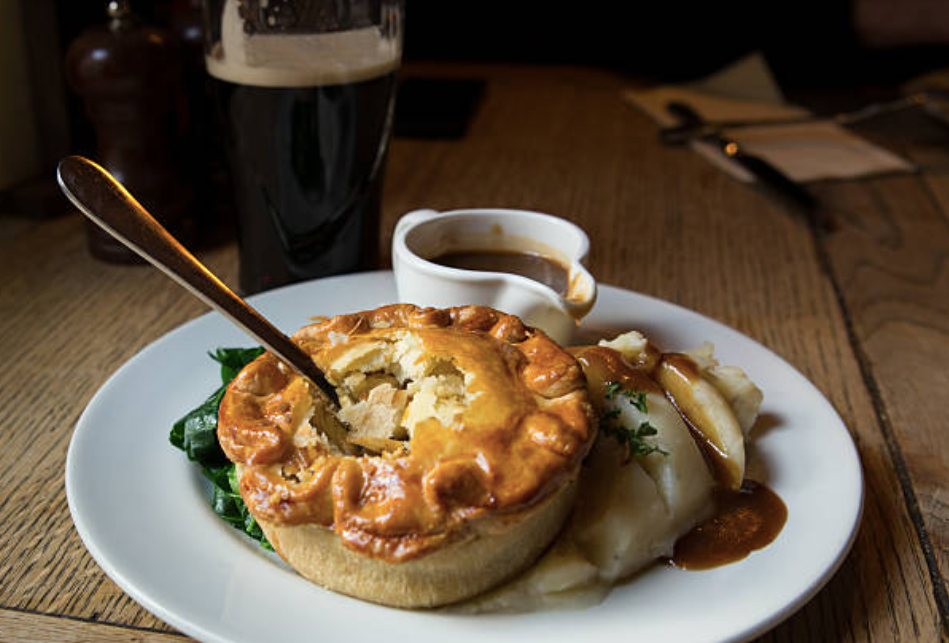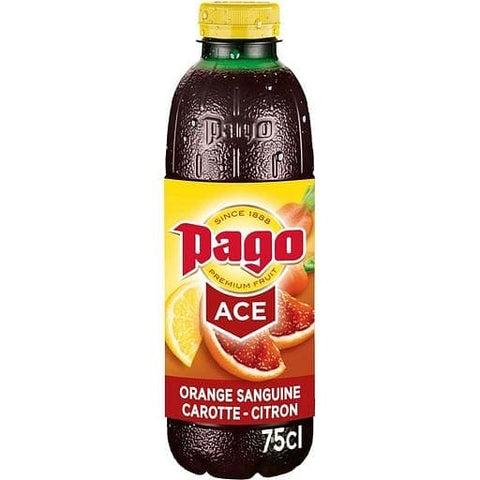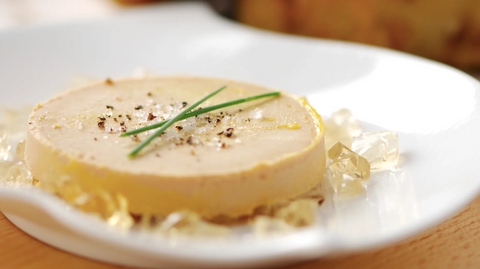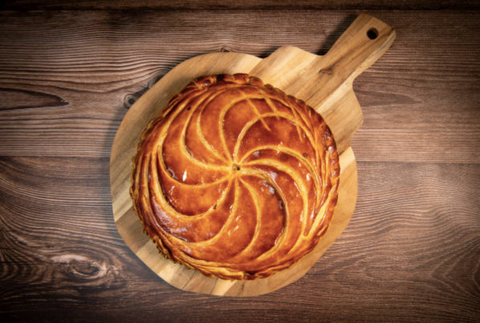What I find very interesting about this country is the variety of food. You can find restaurants, markets, and fast-foods everywhere. That's why I wanted to compare French food with English food because they are different in many ways:
- First, they have different traditions. We usually eat a starter, a main course, and a dessert in France. For example, we like to eat some soup or some salad as a starter, and we usually eat cheese at the end of the meal. On the other hand, in England, people prefer sweet foods, and they don't eat cheese after their meals.
- Then, what they eat during the day is different too. We like to have breakfast with bread or croissants and jam or honey in France. On the other hand, in England people prefer having eggs for breakfast. Moreover, for lunchtime in France, we take something at the bakery, but in England, people prefer eating sandwiches or having an entire home-cooked meal (meat and vegetables).
- Finally, for dinner time in France, French have something light such as a salad, but people in England prefer having something more substantial such as fish and chips or roast chicken with roast potatoes.
Finally, there are little things that are also different such as how
There are many differences between French and English food and the precise language.
French food is generally thought of as being very rich, to the point that many people have been describing it as "fatty" for years. Indeed, how French people eat their main meals every day includes a lot of meat and potatoes, but there are many other aspects to French cooking.
- The difference between English and French food is mainly in preparing their dishes. The French prefer to prepare their meals from scratch with fresh ingredients, while the English prefer to buy pre-made food in the supermarket, which doesn't necessarily mean that it tastes better. If you like to cook your meals, you will be more likely to enjoy them than if you buy pre-made products from the supermarket.
- Another difference between French and English food is that French people will often eat more than one course during a meal. For example, if you go out for dinner in France, then you might expect to have an appetizer (hors d'oeuvre), the main course (Plat principal), cheese (Fromage), or dessert (dessert). On top of this, they might also order a starter before their meal.
French Breakfast vs. English Breakfast
The French enjoy eating a lot. The French diet is rich in fat and carbohydrates but generally low in protein and sugar.
The traditional English breakfast is the most important meal for many English people. It usually consists of fried eggs with sausages and bacon, or perhaps scrambled eggs or poached eggs with bacon. The traditional English breakfast includes fried mushrooms, tomatoes, hash browns, and black pudding. There are also baked beans, which are cooked in tomato sauce.
- France: Traditional French cuisine is generally considered one of the finest in the world; it is rich and full of flavor and is quite varied, with many regional specialties.
- United Kingdom: Traditional British cuisine contains more fat and sugar than healthy diets should contain, but there are options for vegetarians who want to stay true to their dietary preferences while enjoying a "proper" English meal.
Lunch is another big meal in both countries and will typically consist of a starter, main course, and dessert. A traditional French lunch would also include wine.
British dinner is very similar to lunch but is instead called tea or supper, especially in the North.
In France, dinner is either before or after the cinema depending on what time you are going and are usually much lighter than lunch (thinks omelets).
French Cuisine vs. English Cuisine
French food and English food are the most popular cuisines in the world. Both have advantages and disadvantages, but French is considered a more sophisticated, decadent cuisine than English. So if you want to get a high-end meal, you'd instead go for French cuisine.
- English plain food is much simpler, traditional, and often rustic. But it's also very satisfying, nutritious, and tasty. It has become so popular that many restaurants worldwide offer an English dish or two on their menu.
- French cuisine can be traced back to medieval times when the aristocracy was obsessed with fancy, highly decorated dishes made of meat and fat. The crowd loved it because they weren't used to such extravagant delicacies and didn't have anything better to compare with them.
- They would also eat a lot of bread with butter or cheese and drink wine as a main course and not just as an accompaniment to food. They took their time enjoying each course while discussing important topics such as politics or philosophy at length over several hours!

Similarities between the French and British cuisines
Both French and British cooking share a lot of common ground. Fish and chips, for example, is a traditional English dish that is very similar to the French dish Pommes Frites. These dishes may have originated in different places, but they are both deep-fried potato dishes. Another similarity between these two cuisines is that both cultures enjoy eating cheese. Both France and Britain produce many different types of cheeses. These two countries also share a love of butter and milk.
French Desserts vs. English Desserts
You would think that French desserts are all about sugar, but in fact, they are not. They are very much about the ingredients.
The French love their desserts, and so do the English. The French have a long history of sweets, but they have become known for their cakes and pastries more recently. This article will talk about some of the differences between French desserts and English desserts.
- There is no doubt that there are some similarities between French and English desserts. Many of them are similar in terms of ingredients and preparation.
- But some differences set them apart from each other. For example, most French desserts are made with a lot of butter, while English desserts tend to use a lot of sugar.
- You will notice that the French like to eat a dessert before lunch or dinner, while the English prefer to eat after dinner. You will find that many French foods tend to be served as part of a meal rather than as an individual dish.
- This can also be seen in how they prepare their food: the French like to use a lot of salt and herbs, while the English prefer to keep things simple and use less salt or herbs.
French vs. English Desserts: Similarities
- These both countries bake cakes, pies, and pastries; ice cream is famous in both places; both countries make fruit preserves and jams; and they both have candy, which they call "sweets" (and we call "candy").
- Some of the desserts in each country have the same names but are very different, for example:
- a) Éclairs – In France, an éclair is a long choux pastry filled with custard or whipped cream, topped with fondant icing. In England, an éclair is a chewy caramel candy bar coated with chocolate on top and filled with a creamy chocolate filling.
- b) Meringues – In France Meringues are very popular.
French Cheese vs. English Cheese
English cheese tends to be stronger tasting than the milder French varieties. Cheddar is firm when aged and has a sharp flavor that some people can only tolerate. It becomes milder as it ages and loses its sharp taste. Many other English kinds of cheese have a similar sharp taste when they are young and become milder as they mature.
The French prefer their cheeses soft instead of aged like many English varieties. Brie, for example, is soft and creamy with a mild flavor that can be spread on crackers or eaten alone. Camembert is also a soft cheese often served at room temperature as an appetizer or snack. It has an incredibly creamy texture and rich flavor that makes it popular with many people who do not eat other types of cheese.

One of the most widely known English cheeses is Stilton blue vein
The truth is that there are great cheeses made in both countries, and it's a little unfair to generalize. But it's still fun to look at the differences between them and compare some of the best ones from each country.
In France, French drink:
- Lait (milk)
- Citronnade (lemonade)
- Jus (fruit juice)
- Eau gazeuse (sparkling water) or Eau plate (still water)
- Café (coffee)
- Tisane (herbal tea)
- Thé (black tea)
In England, they drink:
- Tea with milk/tea without milk / hot chocolate/coffee with milk/coffee without milk / herbal tea / green tea / black tea... and so many other different kinds of tea!
There are so many drink options in the world it's hard to keep track of them all. What about when you're traveling? You can't always find your favorite drink at every destination. Some drinks that are common in one country are virtually unknown in another.
It's easy to fall into the trap of thinking that British and French cultures are inextricably linked. The two countries have a long history of conflict, conquest, and collaboration, and the cultural influences flow both ways across the Channel. Therefore, it will come as no surprise that British and French drinking habits are similar in many ways — but with some exciting differences.
Wine
France produces some of the most renowned wines in the world. While there is British wine production, it has traditionally been aimed at domestic consumption rather than export. Some perfect examples are coming out of vineyards in Cornwall, but it is still seen as a novelty by most French drinkers.
Beer
Many connoisseurs see British beer as being among the best globally — mainly because it is so diverse. Ales tend to be brewed using traditional methods, while lagers are made using more modern techniques. In France, however, beer is generally considered inferior to wine. France's most notable contribution doesn't help this to the beer world.
Many of us enjoy drinking, and we all know that there are different ways to drink. Some ways are healthier than others. Here's a list:
French drinking:
1) Drink wine with meals. Wine is an appetite stimulant and a digestion aid. It can help you feel full faster, so you eat less. Its antioxidants have been linked to a lower risk of heart disease—the leading cause of death for both men and women in the U.S.
2) Have an apéritif before dinner (a snack or drink before the meal to stimulate your appetite).
3) Drink as they do in France - only with food, never alone as a way to unwind or relax (the way many Americans do with alcohol).
English drinking:
- Plan at least two alcohol-free days each week. It doesn't mean you have to go without alcohol forever but instead, take regular breaks from it.
- There's no need to give up drinking altogether but try not to get into the habit of having more than one or two drinks every day (or week). it will help keep your liver healthy and reduce any long-term risks associated with heavy drinking, such as cancer or heart disease (both of which can be caused by excess alcohol consumption
The French and British are similar in many ways, but it's fair to say that the two countries differ in their approaches to most things.
- For example, the French tend to take a more holistic approach to life – they consider the well-being of mind and body equally important,
- And their medical services are often more oriented towards curing than treating.
In addition to having a shared love of food and its social significance, France and England also believe in the importance of organic food. Both countries are known for their wide selection of organic produce and meat products. Even though organic food may be more expensive than non-organic, both cultures value the benefits it brings to their health, as well as its positive impact on the environment.
Finally, the French and English both appreciate an occasional indulgence in food. Although they may try to eat most of the time healthily, both cultures enjoy eating rich foods on special occasions, such as holidays or celebrations with loved ones.




